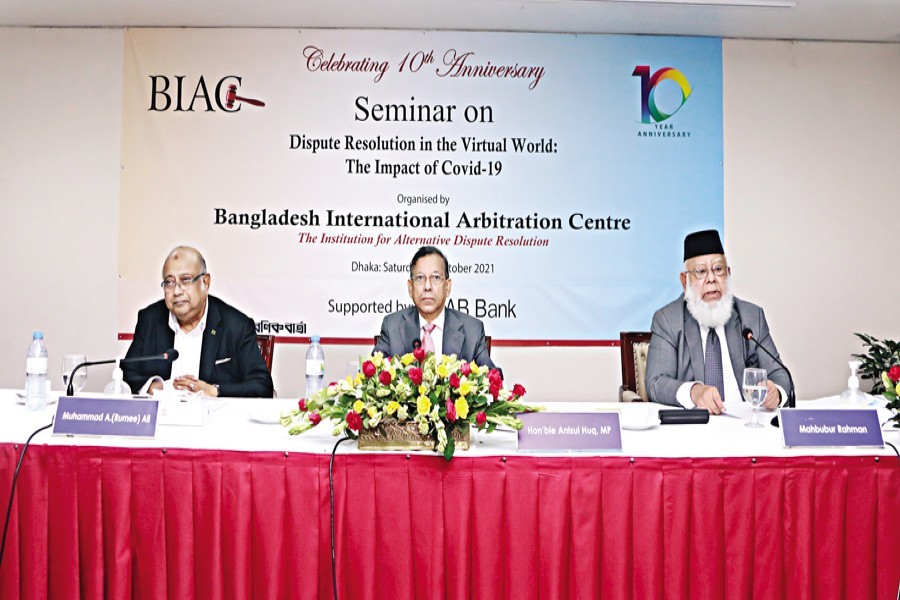The government is considering incorporating appropriate clauses for arbitration and mediation in all government contracts, Law Minister Anisul Huq said on Saturday.
In the wake of the Covid-19, the government has enacted the 'Use of Information Technology by the Court Act 2020' to carry out trials through digital means, said the minister, adding that the judiciary had already started conducting court proceedings via video conferencing.
He said that even after the pandemic, this process would continue and its jurisdiction would be expanded.
The minister was addressing as the chief guest a seminar titled 'Dispute Resolution in the Virtual World: The Impact of Covid-19' at Pan Pacific Sonargaon Hotel in the city on Saturday, marking the 10th founding anniversary of the Bangladesh International Arbitration Centre (BIAC), said a press release.
BIAC Chairman Mahbubur Rahman moderated the seminar.
BIAC is the country's first and only Alternative Dispute Resolution (ADR) institution that has been playing a vital role in resolving commercial disputes amicably.
Speaking on the occasion, the law minister said that the government had taken up a project on e-judiciary.
Mr Anisul lauded BIAC's pioneering role in virtual hearings of arbitration and mediation during the ongoing pandemic and appreciated the recent initiatives and efforts by BIAC towards resolution of commercial disputes outside the court.
Apart from the Arbitration Act 2001, in the last few years some other laws have also incorporated provisions of ADR, said the minister.
Moreover, the government has taken steps to ensure that both foreign and local arbitration awards can be enforced in Bangladesh and is encouraging all government entities to choose Bangladesh at the first instance as the place of arbitration for contracts, he added.
Mr Anisul also said that the government was modernising the Evidence Act 1872.
The law minister announced that he was working on allocating BIAC a grant of Tk 10 crore for its sustainability which was now under process in the Finance Division.
BIAC Board Chairman Mahbubur Rahman in his concluding remarks expressed his gratitude to the government, law ministry in particular, for coming forward and making substantial changes towards promoting ADR in many laws of the country.
Over the span of a decade, BIAC has been facing a rise in the demand for its services and the practice of ADR by numerous commercial organisations and business concerns as well as financial institutions in the country, he said.
Mr Rahman hoped that this demand would continue in future.
He urged the law minister to continue supporting and encouraging adherence to ADR methods in resolving commercial disputes, recovery of loan by banks and specific performance of contracts between the parties.
Speaking on the occasion, A F Hassan Ariff, former advisor to a caretaker government and also a former attorney general of Bangladesh, in his speech said that the Covid pandemic and its impact on all sectors including the dispute resolutions compelled the authorities to reconsider the way ahead to minimise the disruption in dispute resolutions..
Justice AFM Abdur Rahman, a former judge of the Supreme Court of Bangladesh, in his speech strongly argued that despite positive steps by the incumbent government, the non-change of mindset of some of the stakeholders was a great hurdle to advancing ADR through physical or virtual mechanism.
The initial stage of virtual mechanism may have some flaws on smooth proceedings of ADR, but it will be washed out through continuous use of the mechanism, he opined.
An aggrieved party from Singapore may take the benefit of a celebrated arbitrator staying in UK to resolve his dispute with a party from China, that is the charisma of virtual ADR, added the former judge.
In his welcome address, BIAC Chief Executive Officer Muhammad A (Rumee) Ali gave a brief account of the institution's activities and achievements during the last six years of his tenure with BIAC.
He said that being a banker by profession, ADR was a completely different field to him and the struggle to promote ADR despite having the infrastructure and capacity was quite challenging.
On top of that, the pandemic has been especially difficult as it affected the earning streams of BIAC and Rumee Ali appealed to the law minister to save this national institution.
Tarique Afzal, president and managing director of AB Bank Ltd, in his speech said that BIAC had been stirring to improve the dispute resolution environment in Bangladesh.
In her speech, Ms Humaira Azam, MD and CEO of Trust Bank Ltd, said that in this new virtual world of business, ADR had become an essential part of the DNA of dispute resolution during Covid-19.
She said that BIAC had created a new horizon in this regard and we should encourage every institution to try out ADR for its own benefit.
Professor Dr Farhana Helal Mehtab, associate dean of the Faculty of Humanities and Social Science at Daffodil International University, said in the virtual dispute resolution process, there was always a concern about the confidentiality and privacy of the parties' data.
Therefore, a strict privacy policy needs to be adopted under the existing legal framework, she said.
"While we appreciate the robust efforts of our Supreme Court in formulating guidelines on mediation to resolve disputes, we look forward to similar frameworks on virtual settlement of disputes via ADR," Dr Farhana added.
The seminar was attended among others by Supreme Court lawyer Barrister Rashna Imam, BIAC Board Members Rokia Afzal Rahman, Nihad Kabir, Rizwan Rahman, AK Azad, Kutubuddin Ahmed and Osama Taseer.
The Financial Express and the daily Bonik Barta were the media partners of the event.


